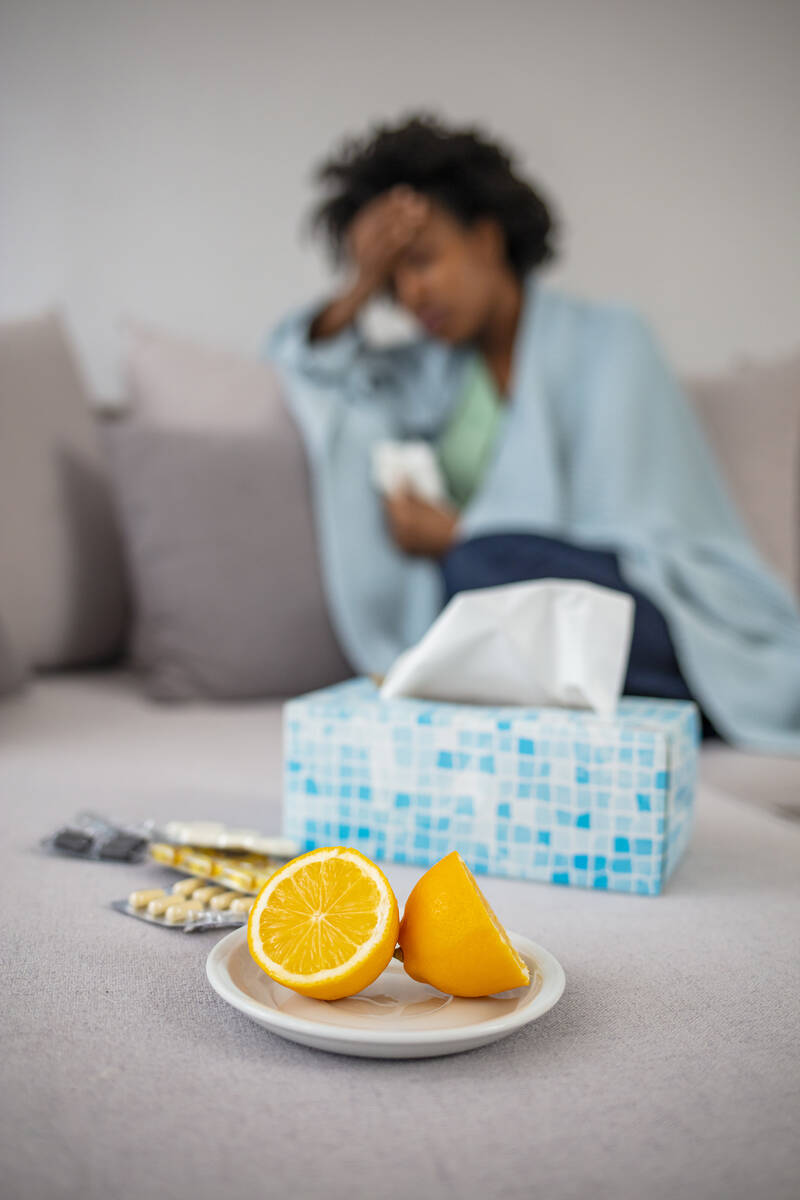A guide to navigating flu season
Every fall, like clockwork, health experts start talking about how important it is to get a flu shot. And every year, some people say that the flu isn’t so bad — until they get it.
Every year, influenza causes as many as 45 million illnesses in the United States, 140,000 to 810,000 hospitalizations, and up to 61,000 deaths.
If you’ve caught the flu, you may be wondering what options are available to you — how to treat the flu for a speedy recovery.
What is the flu?
The flu is a serious respiratory virus that can cause severe complications like pneumonia and sepsis. Although many people with upset stomachs might say they have a “stomach flu,” there is no such thing because the flu is a viral infection that affects your respiratory tract, not your gut.
There are several types of influenza viruses, and each type has subtypes. Seasonal influenza is caused by a different virus every year, which circulates the globe during the cooler winter months. The flu season, from late fall to midspring, is caused by seasonal influenza, but it is possible to get the flu at any time of year.
The flu virus is spread much like a cold virus. If someone with the flu sneezes or coughs, or even speaks, tiny droplets are spread in the air. If you’re close enough, you can breathe these in through your mouth or nose, and you are now contaminated with the flu virus. The flu virus may also linger on surfaces. So, if someone with the flu touches their mouth or nose, or coughs or sneezes into their hand, and then they touch an object like a phone or light switch, they leave the virus on the surface. Then when you come by and touch the same object, the virus can latch onto your skin. If you wash your hands right away, you’ll be fine, but if you touch your nose, mouth or eyes before you wash your hands, you could transfer the virus and become ill.
Symptoms of the flu
Some flu symptoms are similar to the symptoms of a cold, such as a cough or sore throat, but others aren’t. “Symptoms of the flu include fever, fatigue, cough, body aches, headache, sore throat and stuffy/runny nose,” says Dr. Corey Fisher, a family medicine physician with the Cleveland Clinic. “They tend to come on very suddenly.” Vomiting and diarrhea are not common among adults who have the flu.
For some, the symptoms are mild, and they just feel lousy for a few days. But others can have severe symptoms.
Flu symptoms in kids are pretty much the same as for adults, although children might develop nausea, vomiting and diarrhea.
Coronavirus vs. flu
The symptoms for COVID-19 — caused by the novel coronavirus — and the flu are very similar at first. The major difference is that the symptoms for COVID-19 can be more severe. COVID-19 has an additional symptom that doesn’t affect everyone, but it is rather noticeable: They lose their sense of taste and smell.
How to treat the flu
There is no cure for the flu. Most treatments address the symptoms, helping you get through the day and night more comfortably. Some people who use home treatments believe they can help boost their immune system.
Home remedies
The flu has been around for centuries, and over the years, people have come across home remedies they feel help them treat the infection. According to Dr. Philip Junglas, an internist at the Cleveland Clinic, the most effective and most important is hydration (drinking plenty of fluids) and rest. Fisher says that “tincture of time” is what does the trick.
But here are some commonly shared home remedies for the flu:
Chicken soup: Yes, really, chicken soup is an old standby when it comes to treating the flu through food. First, the soup is hydrating, so if you don’t feel like drinking a lot of fluids, you can sip the chicken soup and get some fluid that way. Also, the warmth of the soup may help open and clear the nasal passages, so you feel less stuffed up, and depending on the ingredients, the soup can provide your body with much-needed nutrition, electrolytes, protein and carbohydrates.
Honey: Adding honey to a cup of tea or hot water might help relieve flu symptoms, such as sore throat and coughing. But don’t give honey to a child under a year old because there is a risk of infant botulism, a type of food poisoning.
Saltwater gargles: Adding a half teaspoon of salt to warm water and gargling can help relieve the pain from a sore throat.
Hot, steamy showers (or a tent of steam): Taking a hot shower produces steam that could help clear up a stuffy nose. Or you could pour boiling water into a bowl and bend over the bowl to breathe in the steam. If you put a blanket over your head, you make a bit of a tent that contains the steam.
Nasal irrigation: Nasal sprays and irrigation systems can help you clear your stuffy nose and sinuses, but it’s important to follow the product’s directions.
Vitamin C: Vitamin C has some “prevention power,” according to Harvard Health, and is used by our bodies to support immune health. Citrus fruits are an excellent source of vitamin C, and you can easily add more into your diet by drinking orange juice.
Supplements: While not scientifically proven, many people believe in the power of supplements to boost their immune system, ease symptoms and speed up healing. Supplements include elderberry, vitamin C, echinacea, even garlic.
What about OTC flu medicine?
Walk into any drugstore, and you will see shelves of over-the-counter cold and flu medicines. These aren’t cures for the flu, but treatments that might help relieve the symptoms that make you feel so lousy.
“OTC medications are meant to treat the symptoms of flu and can include ibuprofen or acetaminophen for fevers/headache/sore throat/body aches, nasal saline for nasal congestion, guaifenesin for congestion, and dextromethorphan for cough,” Fisher says. But, he adds, “Patients should consult with their (primary care physician) before taking any OTC medications or supplements for flu symptoms.”
Junglas says there are no “good” OTC flu treatments. “There are many studies on the medications (such as guaifenesin, dextromethorphan and others). The studies have shown that when used as directed, they rarely hurt anyone,” he says. “Unfortunately, these studies also show minimal to no effectiveness. However, since there is little risk of harm, and a cough can be a big nuisance, many persons will try one or more of these (often produced in one “combined” product with exaggerated claims of symptom relief on the label).”
If you do choose an OTC product, be sure to read the label so you don’t double dose on any of the ingredients. Many of the products contain ibuprofen or acetaminophen, which means you shouldn’t take those separately to try to treat your headache or aches and pains. Also, if you have any prescription medications or even if you have a medical condition that doesn’t require drugs, speak with your pharmacist to ensure the product is safe for you.
How about prescription meds?
While there’s no prescription flu medication that can cure you of the respiratory infection, there are some that can help shorten the length of time you are ill. They might also make the symptoms less severe.
Called antivirals, these drugs must be taken as soon as possible after you first experience flu symptoms. According to the Centers for Disease Control and Prevention, the antivirals “can lessen fever and flu symptoms and shorten the time you are sick by about one day. They also may reduce the risk of complications such as ear infections in children, respiratory complications requiring antibiotics, and hospitalization in adults.”
These medications might have a stronger role among people who are at high risk of complications, like pneumonia, from the flu. These include people who have lung disease, neurological diseases, blood disorders and heart disease.
They also might help people with the flu who were sick enough to need to be hospitalized.
The drug most people have heard of is Tamiflu (generic name: oseltamivir phosphate), but there are others, too, such as Relenza (zanamivir), Rapivab (peramivir) and Xofluza (baloxavir marboxil).
How long does the flu last?
The initial illness from the flu can last up to a week, although some symptoms, such as fatigue or a cough, can last much longer. People who have received a flu vaccine might still get sick, but usually their symptoms are not as severe and the illness doesn’t last as long.
Wondering how long you are contagious if you have the flu? According to the CDC, people can spread the virus as early as a day before they even know they are sick, before symptoms start. Once you know you’re ill, you are still contagious for up to a week — longer if you have a weakened immune system.
Should I get a flu shot?
The general answer is yes, but it depends on your individual state of health and what your doctor recommends.
The CDC advises that everyone over the age of 6 months — especially those at high risk for complications — get a flu shot, even pregnant women. Those at high risk for complications include people who are over 65, who have chronic illnesses, and who have a weakened immune system, among others.
In general, those with allergies to any of the vaccine ingredients shouldn’t receive it. People with a history of Guillain-Barre syndrome should speak with their doctor before vaccinations.
You might have heard things about flu shots in relation to COVID-19. Although they are both respiratory viruses, the flu shot will not protect you from COVID-19. That being said, it’s still important to get a flu shot.
Because the symptoms of the flu and COVID-19 are so similar, if you become sick enough to have to go to the doctor or hospital, they have to assume that it’s COVID-19 until it’s been proven not to be. Although rare, it would be possible to get both infections at the same time. And that could be very serious.





















